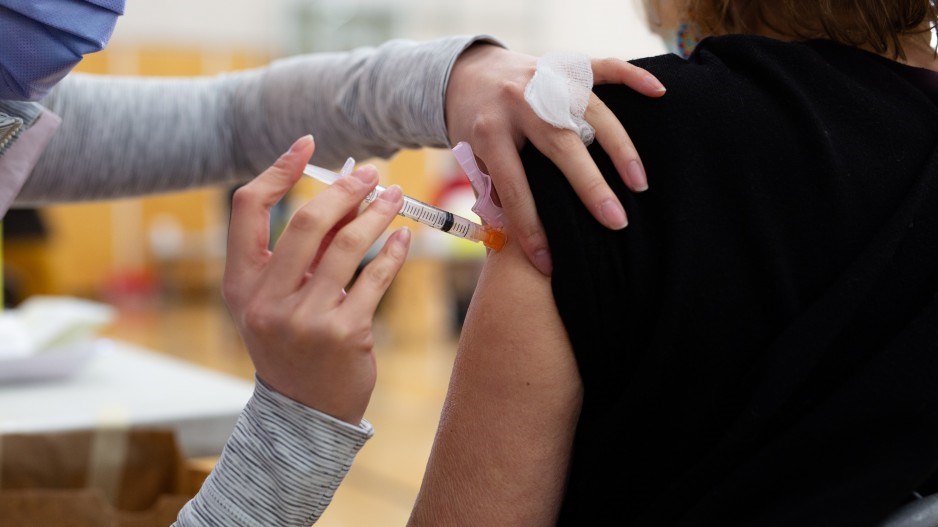Teachers, police officers and a host of other frontline workers will be among the first 322,000 British Columbians to receive vaccinations against COVID-19 outside of those in their age group.
Premier John Horgan confirmed Thursday the province now expects to receive 340,000 doses of the AstraZeneca plc vaccine from both the Serum Institute of India and the COVAX sharing program by the end of May.
While the B.C. immunization plan calls for vaccinations based on descending age groups, provincial officials had previously promised to use the AstraZeneca vaccine for frontline workers.
Horgan highlighted professions such as teachers, police, grocery workers and those working at food processing plants when making the announcement.
Child care staff, manufacturing workers, wholesale/warehousing workers, staff in congregate housing, staff at correctional facilities, those working in cross-border transport, quarantine officers, certain postal workers, bylaw officers and those working at outbreak sites are also being prioritized beginning — for the most part — in early April.
The province is selecting these workers based on concerns they’re in industries where full use of personal protective equipment and barriers can be challenging, outbreaks and clusters have occurred or are ongoing, and workers must live or work in congregate settings.
“We will also be focusing again on those higher risk industries,” B.C. provincial health officer Dr. Bonnie Henry said during a media briefing.
There are 16,000 workers identified at 53 food-processing facilities, six industrial sites and five congregate housing sites that are being prioritized in the Vancouver Coastal Health region.
Thousands of temporary foreign workers — those typically living in communal housing on agricultural sites — will also be prioritized as they undergo isolation in Richmond hotels upon arriving in Canada.
“This allows us to really move ahead with this large shipment of vaccine to target these groups of people who we know are essential for keeping our community going, and who have been working throughout this pandemic,” Henry said.
She urged workers not to reach out to the call centres that have been fielding vaccination appointments based on age groups. Health authorities will be reaching out to employers to arrange the jabs for prioritized workers in early April.
In the Fraser Health region, 22,500 doses will go towards immunizing people at 71 food-processing plants, 48 farms or greenhouses, and additional industrial sites facing outbreaks.
Doses totalling 15,000 will be immunizing workers at five industrial camps in the Northern Health region, while 6,500 doses will be administered in the Interior Health region to people working at three industrial workcamps, 34 food processing facilities and six farms or nurseries.
One thousand doses are being allocated for Island Health, specifically for those working at four large food-production facilities.
The province expects to administer the first 272,000 doses in April and another 69,000 by late May or early June.
Penny Ballem, executive lead for B.C.’s immunization plan, revealed the province is now expecting a combined 906,000 doses from Pfizer Inc. and Moderna Inc. to arrive between this week and April 18 on top of the AstraZeneca doses.
“We're very confident that we are going to be able to use this [AstraZeneca] vaccine in a very timely expedited way to move up our population protection,” she said, adding the province will be maintaining a reserve of 140,000 doses in the event of any shipping delays.
“We do not want to be cancelling any vaccination clinics that have already been scheduled.”
Unlike the Pfizer and Moderna vaccines, the AstraZeneca vaccine can be stored at fridge temperatures — not ultra-cold temperatures of up to -80C — making the AstraZeneca vaccine easier to transport and distribute.
Henry said the province is working with the B.C. Pharmacy Association to deliver those vaccines.
The Pfizer and Moderna doses will be primarily administered to the general population, although Horgan described B.C.’s vaccination plan as “flexible.”
Workers prioritized for vaccination with the AstraZeneca doses have the option of declining their jabs and awaiting shots within their same age group.
All three of the vaccines require two doses. B.C. began extending the interval between doses from six weeks to 16 weeks earlier this month in a bid to vaccinate more people, albeit at lower levels of protection until they can get their second dose.
Henry said she remains hopeful that as B.C. ramps up its vaccination plans, students in high school might have the opportunity to celebrate graduation in some sort of ceremony in the coming months.
But she said those counting on an April wedding will need to rethink their plans despite the accelerated vaccine rollout.
@reporton


.jpg;w=120;h=80;mode=crop)

